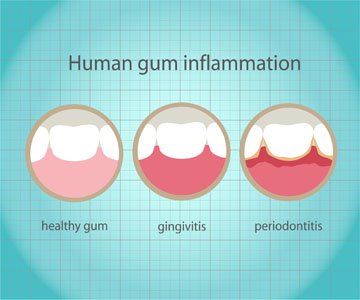 Gum disease prevention is an important aspect of oral health. We encourage everyone to take the steps necessary to keep their gums in good condition just like they take the steps necessary to maintain their health. When it comes to oral health, most people understand that it is important to brush teeth on a regular basis and to be careful not to harm them.
Gum disease prevention is an important aspect of oral health. We encourage everyone to take the steps necessary to keep their gums in good condition just like they take the steps necessary to maintain their health. When it comes to oral health, most people understand that it is important to brush teeth on a regular basis and to be careful not to harm them.
Few, however, think about their gums on a daily basis. Gums are just as important to oral health since gum disease can lead to tooth loss. As such, we recommend taking several steps to keep gums healthy.
Gum disease prevention tips
#1. Floss
Flossing is one of the most important things people can do to prevent gum disease. It is important to take the floss all the way down along the line of the tooth to remove any plaque from between the area of the tooth and actual gum. Most people make the mistake of stopping where the gum line begins. The lower portion of the tooth can trap plaque and cause tartar build-up as well. Thus, cleaning it out on a daily basis is necessary for true gum disease prevention.
For anyone who does not like to use traditional floss, floss picks can be used and these are a convenient tool that can be held in the hand and easily moved in between the tooth and gum.Some people even carry a flossing pick with them so that it can be used for lunches and snacks.
#2. Avoid dangerous foods
Some foods and drinks are bad for oral health and that includes being bad for the gums. Stay away from sugar, candy, processed foods and anything acidic. These foods can have negative implications when it comes to oral health.
#3. Use a soft toothbrush
When a toothbrush is too hard or abrasive, it can actually damage the gums and cause them to recede. Gum tissue is incredibly sensitive so using a hard toothbrush on a daily basis can cause the gums to inflame, bleed and begin to recede from the tooth structure. This can also increase the likelihood of gum disease forming. Thus, it is important to switch to an electric toothbrush or one that is soft.
#4 Brush for two minutes
Patients need to brush teeth for a full two minutes at a time, twice per day. Regular brushing ensures that the teeth and gums get a good clean and that plaque does not remain on the tooth structure. Patients need to complete this routine every day for life.
#5. Avoid tobacco use or excessive alcohol use
It is also important not to drink alcohol in excess, smoke or chew tobacco. These things can be bad for health overall but are particularly dangerous for oral health.
Visit our clinic
Gum disease prevention is important but it is not always possible to prevent gum disease. Sometimes, gingivitis will form even with the best of intentions. At this point, the best thing a person can do is to visit our clinic. Using laser dentistry, we can perform a deep cleaning to remove plaque and tartar that has become trapped under the gum tissue. This will allow the gums to heal and to be restored without the need for invasive procedures.
Related Posts
Simple, Effective Strategies for Gum Disease Prevention
A robust oral hygiene routine serves as the foundation for a healthy smile and gum disease prevention. When plaque and tartar accumulate along the gumline, the risk of periodontal issues increases significantly. …
Later Stage of Gum Disease: Periodontitis
Along with cavities, gum disease is perhaps the most common oral health condition that people struggle with. There are ways to prevent this problem from occurring, but it is not something to …
The Benefits of Laser Therapy to Treat Gum Disease
Preventing gum disease is one of the most important steps you can take in your oral health. You have heard a lot about keeping your teeth clean to avoid cavities, but your …
Is Periodontal Disease the Same Thing as a Gum Infection?
Looking for more information on periodontal disease? Being diagnosed with any dental-related disease will cause harm to one’s oral health, making it essential for everyone to make regular dental check-up appointments. This type of appointment …
